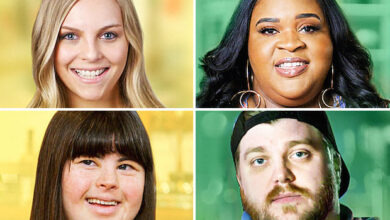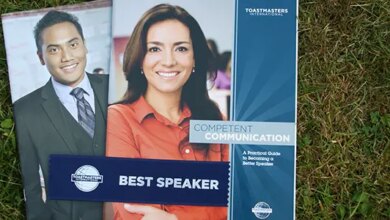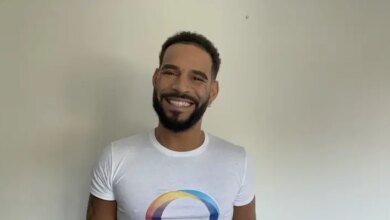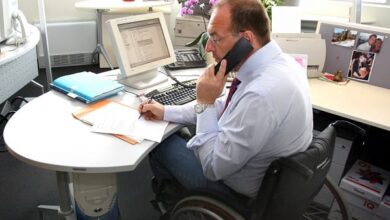Entrepreneurs with disabilities break down barriers
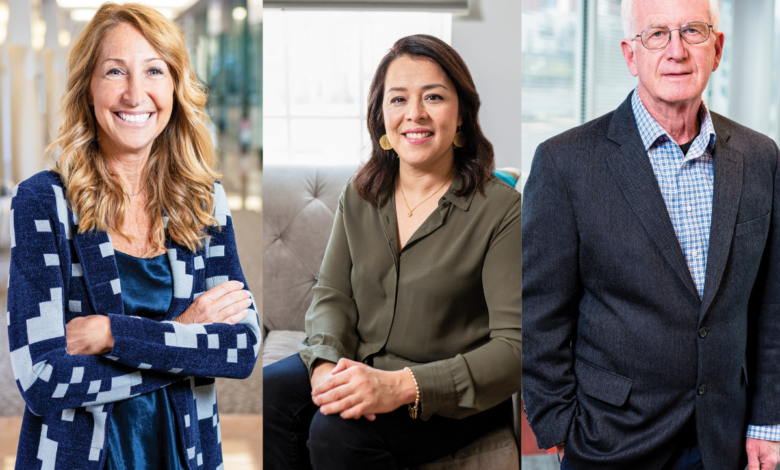
Ten years ago, Bob Mather of Chevy Chase retired from a legal career dedicated to fighting for disability rights, including decades at the U.S. Department of Justice and a stint running his own practice, which focused on employment discrimination cases.
But retirement didn’t sit well with Mather. Deaf since birth, the lawyer and father of two deaf children says he realized there was more he could do to help increase accessibility for people with hearing issues. In 2019, along with four other deaf professionals in the U.S. and France, he co-founded World in Sign, a company based in downtown Silver Spring that provides a one-stop shop for accessible communications and telecom services, including on-demand video interpretation services.
“I saw there was still a need for improvement in the accessibility world, and I noticed that many, many solutions were available that made services and programs more accessible for all,” says Mather, 72, who used American Sign Language interpreted by Josie Brown, the company’s director of sales and partnerships, during a Zoom call.
Mather and his fellow disabled entrepreneurs have focused on hiring workers with a hearing disability, though the company had to furlough its staff of 12 in early March until “the situation becomes solvent,” according to Mather. “We work together as a great team innovating ideas and solutions and possibilities to develop and test,” he says.
Not all employers are as committed as World in Sign to hiring people with disabilities. Disabled people who are outside the workforce can consider entrepreneurship and self-employment, but those who pursue alternative options are “hindered by limited access to affordable start-up capital and a scarcity of supports, services and programs tailored to their unique needs and challenges,” according to an April 2022 report by the National Disability Institute, a nonprofit based in Washington, D.C.
According to that report, it’s also difficult to determine how many people with disabilities are self-employed because disability status isn’t captured in nationwide surveys about small businesses, such as the U.S. Census. “As a result, the absence of disability data renders business owners with disabilities invisible,” the report says. “This creates an obstacle to building a case for developing targeted programs for this underserved and too often overlooked population.”
The COVID-19 pandemic was a game changer for people with disabilities, says Trish Gallalee, who chairs the Montgomery County Commission on People with Disabilities. That’s because the shift to telework alleviated a major barrier—finding transportation—for those seeking jobs and expanded the possibilities for people who can’t physically work in an office for various reasons or may need care while working. “Telework really opens up a lot more avenues where employers may not have been so inclined to allow for full-time telework,” says Gallalee, a federal government employee who has been a paraplegic since childhood.
“Employment is key because that gives you the ability to get a home and to be part of society and to be a contributing member, and it means so much because that’s where equity comes in, because now you’re like everybody else,” she says.
Montgomery County is home to a number of entrepreneurs with disabilities. Here are three who spoke to Bethesda Magazine about their experiences.

Karen Herson
Founder of Concepts Communications
Diagnosed with dyslexia at age 7, Karen Herson has learned to cope with a disability that impacts her daily, though it is invisible to most people. “I think people meet me and they have no idea I have a disability,” she says.
As a young child, she “used to do everything backwards,” like writing and speaking. “Instead of saying nail polish, I would say pol nailish,” says Herson, 54, of North Bethesda. Growing up in New Jersey before it became common for students with special needs to be mainstreamed with other students, Herson was in classes with students who had a range of physical and intellectual disabilities. As she moved through school, eventually graduating from George Washington University, she learned to cope with dyslexia by writing everything in notebooks.
“I still do it to this day, even though I have a computer, in order to process it and get it into my head,” she says. Sometimes having an intellectual disability “becomes a superpower because it makes you have to think in a different way.”
Herson says dealing with the word retention and memory issues resulting from her disability have helped her as an entrepreneur. “Knowing I had to process information in a different way really helped me excel for my clients,” she says. “I have a process in place that really helps to work with my clients to clearly support their communications needs, but [helps] them to slow down and create attainable goals that truly have measurable impact.”
After graduating from college, Herson worked for several consulting firms. In 1996 she decided to start her own firm, Concepts Communications, which addresses such issues as disability inclusion, workforce development and communications access for the disabled. Over the years, the firm has won several contracts from the U.S. Department of Labor, including for projects focusing on education awareness and disability employment. The firm recently created four public service announcement videos for the department’s Office of Disability Employment Policy’s Campaign for Disability Employment.
In addition to dealing with dyslexia, Herson was diagnosed about five years ago with Raynaud’s syndrome, which affects the blood flow to her hands and feet, impacting typing and other work tasks. Four years ago, she was diagnosed with colon cancer. “With all those elements, that kind of woke up my awareness process of being a disabled entrepreneur,” she says, noting that she had to rely on her staff to keep her business running while she underwent three months of chemotherapy.
Though she hasn’t faced discrimination as a disabled entrepreneur, she says she has found that “if people don’t know I have a disability, they sometimes find my word retention issues funny, which sometimes rubs me the wrong way, but I always try to use these situations as teaching moments.”
Herson says the goal of advocacy work like the Campaign for Disability Employment helps raise awareness to the value of hiring people with disabilities. Still, “we do all this outreach and engagement, and we wonder: Does any of it make any difference? Are people hiring people with disabilities because of what we’re doing?” she says. “That’s the hardest part of any kind of awareness campaign. I don’t know. I hope so. That’s why it takes someone like me telling my story. It does help.”

Nurturing Hope
Counseling, which
offers teletherapy. Credit: Photo by Jimell Greene
Patty Rivas
Founder of Nurturing Hope Counseling
These days, Patty Rivas is busy working as a psychotherapist out of her Clarksburg home and also running an auto-detailing business that she took over from her stepfather when he died in 2017, serving three local car dealerships.
Twenty-eight years ago, she was facing life as a quadriplegic after a bullet fired by her boyfriend’s gun passed through her neck when she was driving in Arlington, Virginia, on their way home from a nightclub.
Rivas, who was 18 at the time, says she can’t recall exactly what happened that night, but believes her boyfriend’s gun went off when she panicked and pressed the brake pedal after he said they were being followed by someone. Rivas says she didn’t know the weapon was in the car. “I don’t remember the full details,” she says, “but from what I gather, it wasn’t intentional for it to hit me.”
The spinal cord injury caused by the bullet left her a quadriplegic. “It was definitely a difficult and challenging time for me, just emerging into adulthood, and this completely changed my life,” says Rivas, who was attending college before she was shot. “But the type of person I am, I’ve always been very optimistic, I’ve always just tried to look ahead.”
Paralyzed from the neck down, Rivas returned to her mother’s home in Rockville and got on with her life, always buoyed during difficult times by the strong support of family and friends. With “a lot of therapy,” she eventually regained the use of her arms and legs.
“I’ve come pretty far, because when I first got injured, doctors told my parents that they really didn’t see me ever walking again. I use a walker. I move around pretty independently,” says Rivas, now 46. “I drive. I go up and down the steps. For long-distance walking I still use a wheelchair.”
Using a manual wheelchair, she graduated from Trinity College (now known as Trinity Washington University) in the District, then earned a master’s degree from the University of Maryland School of Social Work in Baltimore.
Determined to become as independent as possible, she learned how to drive with hand controls and took a job working in child protective services in Prince George’s County. But she was frustrated that her limited mobility prevented her from doing investigative work in the field. “It’s not until you’re in it that you realize that I’m limited or it’s difficult to do,” she says. “That was pretty hard, because I wanted to be able to experience all of that.”
A couple of years later, she left social work to help run a Latin market that her parents had opened in Derwood. After six years or so, the family closed the market and Rivas went to work for Identity, the Gaithersburg nonprofit serving Latino and other historically underserved youths, for about eight years. She left Identity in 2021 to care for her ill mother and opened her own psychotherapy practice, Nurturing Hope Counseling, offering telehealth services.
Rivas decided to start her own business because she wanted the ability to set her schedule and to be able to incorporate therapy and exercise into her workday. Safety also was a major factor in her decision to work remotely from home.
“One of the things I always think about is I’m in a position where I can’t necessarily protect myself,” she says. “So I always think about what’s in my best interest and what’s safe. So for me right now, doing the virtual sessions is what works out for me.”
Rivas spends about 30 hours each week seeing clients and about 10 hours handling administrative work for the auto-detailing business, American Cleaning and Detail, that she promised her stepfather she’d keep going. She relies on her operations staff to run the automotive business, which she hopes to expand.
“People have asked if I ever felt discriminated [against] in any way. From my experience, I did not have that,” she says. “I knock on wood because I am very fortunate. I’ve come across other people that have shared their story and it’s not been the same.”

Bob Mather
Co-founder of World In Sign
When Bob Mather was growing up, deaf people like him were taught how to live in a hearing world by using the oral method, which favored development of speech and lipreading instead of sign language to communicate.
By the time he was in high school, Mather was doing well in classes by relying on reading lips, but he wasn’t happy with himself, he recalls. When he was 17, he started reading literature about the struggles of African Americans with identity and their treatment by society. “I found I actually had a similar feeling to that literature I was reading,” says Mather, who is white. Reading works by Black authors helped him realize that he needed to own his identity as a deaf person. “I had a constant struggle with myself, with my identity to always be a hearing person, and then I realized that wasn’t right for me and I was proud of who I was and who I am, and so I learned sign language,” says Mather.
His signing skills advanced when he attended the National Technical Institute for the Deaf at Rochester Institute of Technology in upstate New York, where interpreters were provided in his classes. “I had never had that experience in school,” he says. “So instead of missing words from the teacher and trying to guess what the lesson was and reading lips—if you’re reading lips, you’re guessing—finally I didn’t have to miss the words. I didn’t have to miss what people were saying.”
Mather met his wife, Sue, at RIT, and both graduated with degrees in social work. During the time they were planning to marry and start a family, they discovered that they needed to earn graduate degrees in order to become licensed social workers. Sue then “came up with a crazy idea” that Bob should go to law school. “I said, ‘You have to be able to speak and be able to hear. Law school?’ ” he says.
So Mather asked friends for opinions and “they all told me, ‘No. No. No. No. There’s no way,’ ” he says. “That enraged me. So that was my negative motivation to go to law school. I didn’t want to be a lawyer. But when they told me no, I was like, I have to do it.”
Attending law school at DePaul University in Chicago presented its own challenges, says Mather, who notes that accommodations for disabled people weren’t federally mandated at the time. He had to hire his own interpreter, using funding from a vocational rehab program.
After graduating, he was hired as a lawyer for the National Center for Law and the Deaf at Gallaudet College, which became Gallaudet University in 1986, in Washington, D.C., and then moved to the U.S. Access Board for six years, focusing on ensuring access to federally funded facilities. Mather then worked for the Department of Justice for more than 30 years. He helped draft the Americans with Disabilities Act, which was signed into law in 1990.
Since ending his retirement by co-founding World in Sign, Mather and the team have been working on developing and providing a variety of products, including on-demand access to interpreters via smartphones for those who need it, such as police officers making traffic stops.
As an entrepreneur, Mather says he’s found that it’s not his disability that can hinder efforts to build his business, but “rather the inaccessibility of services” from prospective clients. “For instance, effective communication with them in person often requires the use of qualified interpreters,” he says. “We have to provide our own.”
Throughout his career, Mather has focused on changing people’s perspective to understand that everyone benefits from increasing accessibility, such as by providing on-demand interpreters. “The interpreter isn’t just for me; it’s for you, too,” he says. “We don’t have a special need. We just have a right to have this access, the same access as others.”
Contributing editor Julie Rasicot lives in Silver Spring.
This story appears in the May/June issue of Bethesda Magazine.

